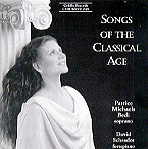Welcome to a European salon in the early 19th century. There’s the singer over there, the lovely-voiced soprano Patrice Michaels Bedi, standing next to her accompanist David Schrader and his fortepiano, an impressive instrument built some 15 years ago by the famous Viennese maker Anton Walter. The program we’re about to hear is an interesting one–eclectic, yes, but it also contains many songs by composers, many of them women, whose music would later totally vanish from public awareness. For now, though, a romance by Maria Szymanowska or Pauline Duchambge, or a song by Sophia Westenholz or Isabella Colbran will serve our recital’s purposes just fine, fitting in nicely with several Haydn canzonas (which themselves are unreasonably neglected these days), songs by Schubert and Beethoven, and a little solo cantata by Mozart.
No one is likely to doubt Bedi’s tonal beauty, agility, or expressive range, or the assuredness and technical skill that informs all of her singing. She is an accomplished and experienced performer for whom these songs obviously are very meaningful. And indeed, it’s a rare privilege to hear songs from this period, let alone performed with such sincerity and refinement. For me, however, such a program–a whole bunch of songs that have no real musical, ideological, or even stylistic connections, no real reason to be lumped together except for their broadly defined dates of origin–wears thin after the first 30 or 40 minutes (and this one is a hefty 79 and a half minutes). There seems to be no logic to this recital, except perhaps that the songs are among Bedi’s favorites.
And, I also question the choice of the fortepiano for the accompaniment. Okay, it’s the instrument that most likely would have been used back in the late-18th/early-19th century, and it’s charming to hear (and, I’m sure, fun for the player). But, and this comes from one who generally supports the use of period strings, winds, brass, and percussion, the fortepiano obviously is an imperfect instrument on the way to being something better. When we hear one of these instruments, we are not likely to be impressed with anything except the player’s relative ability to get some real expression out of it. In contrast, early strings, whether viols or members of the modern violin family, were perfectly fine by themselves, and well-suited to the music written for them, with later so-called “improvements” being essentially related to volume and projection.
Nevertheless, this takes nothing away from pianist David Schrader’s excellent accompaniments, which are as characterful and animated as the instrument will allow. And his many interactions (27 songs in all) with Bedi show a familiarity and musically harmonious camaraderie that gives welcome energy and authority to the performances. You’ll find many delights on this disc–your salon experience will be rewarded with memorable discoveries, such as the above-mentioned Szymanowska, and the sheer pleasure of Bedi’s singing, especially in the French and Italian songs. The sound, too, is first rate, giving us the full flavor of the voice and–for those who appreciate it–Schrader’s colorful fortepiano.
































